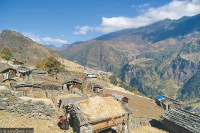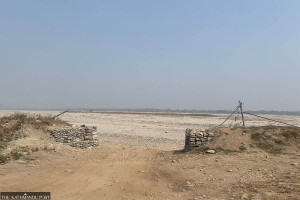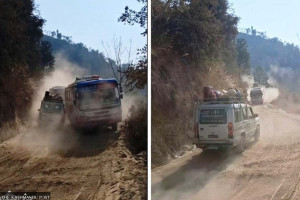Koshi Province
Food shortage in Sankhuwasabha villages as China border closure continues since 2020
Bhotkhola Rural Municipality distributed rice in the affected villages of Thudam, Ridak and Chhumusur on Wednesday.
Dipendra Shakya
Food shortage is looming large in the Bhotkhola area of Sankhuwasabha, a hill district in Koshi Province.
The villagers, who live near the border with China in Bhotkhola Rural Municipality and are dependent on Tibetan markets for daily supplies, are facing a shortage of food grain and other essentials after the border closed by China since the Covid pandemic three years ago has yet to reopen.
“The villagers in the Bhotkhola area are facing a shortage of food due to the border closure. That’s why the rural municipality has started distributing food in the area,” said Wangchhedar Bhote, the chairman of Bhotkhola Rural Municipality.
On Wednesday, the local unit distributed rice to the villagers in the outlying Thudam, Ridak and Chhumusur settlements of the Bhotkhola Rural Municipality. The Ministry of Internal Affairs and Law of Koshi Province provided 90 quintals of rice for distribution among the affected residents of the Bhotkhola area. Various organisations and individuals also supported the local unit to supply food to the people of the affected area.
According to Bhotkhola Rural Municipality, 180 kg of food items was distributed to each household in Thudam while 90 kg was distributed to each household in Ridak and Chhumusur. There are a total of 13 households in Thudam while 91 families live in Ridak and Chhumusur settlements.
According to Bhote, the rural municipality is committed to managing the food crisis in the Bhotkhola area. “We need more rice for the locals of the Kimathanka area. We have requested the district disaster management committee and other donors to manage food. Bhotkhola Rural Municipality has asked the Koshi government to provide 500 quintals of rice,” said Bhote.
Villagers living in Bhotkhola and other settlements near the Nepal-China border are dependent on Tibet for daily essentials, as the area has yet to be connected to the national road network. It takes five days on foot to reach the villages from the district headquarters, Khandbari. Tibet is also the major market for the locals selling medicinal herbs, woolen rugs and livestock. Only millet, maize and potatoes are grown in Bhotkhola, that too in small quantities which are not enough for the villagers.
Meanwhile, communication services have also been disrupted in the Bhotkhola area over the past week. A strong storm coupled with lightning damaged a telephone tower of Nepal Telecom in Lachidanda on April 20, cutting off all communication services. “It may take time to repair the damaged telephone tower. A team of technicians from Biratnagar will be dispatched to the area soon,” said Bhote. According to him, disruption in communication is a regular occurrence in the settlements along the Nepal-China border in the district.




 14.24°C Kathmandu
14.24°C Kathmandu












